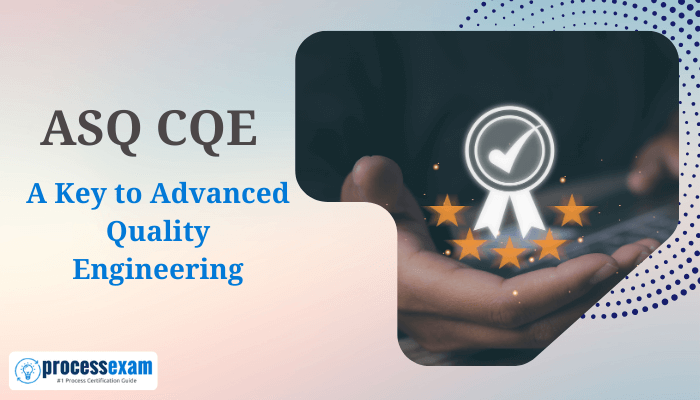
The New Era of Quality Management and ASQ CQE’s Role
Quality management is evolving at an unprecedented pace. With industries becoming more competitive, the need for highly skilled quality engineers has never been greater. The ASQ Certified Quality Engineer (CQE) certification stands as a key credential in this transformation, equipping professionals with the expertise to maintain and enhance quality standards.
With CQE certification, professionals master quality control principles, statistical analysis, and risk management, enabling organizations to reduce defects, improve efficiency, and maintain compliance with international standards. But how does ASQ CQE shape the future of quality management? Let’s explore.
Emerging Trends in Quality Engineering: What’s Changing?
Quality management has undergone significant advancements, integrating new methodologies and technologies that streamline production and ensure superior product outcomes. Here are some key trends shaping the future:
1. AI-Driven Quality Control
Artificial Intelligence (AI) is revolutionizing how companies detect defects, predict failures, and automate quality assurance processes. ASQ CQE Certified Professionals are at the forefront, leveraging AI-driven systems to enhance accuracy and productivity.
2. Data-Driven Decision Making
With big data analytics, organizations rely on data-driven insights to identify patterns, optimize manufacturing processes, and minimize waste. The CQE syllabus includes Quantitative Methods and Tools, equipping professionals with the ability to analyze and interpret data efficiently.
3. Lean and Six Sigma Integration
Companies increasingly adopt Lean Six Sigma methodologies to eliminate inefficiencies and improve quality outcomes. ASQ CQE training emphasizes these principles, ensuring certified engineers play a crucial role in operational excellence.
4. Stringent Regulatory Compliance
Industries like pharmaceuticals, aerospace, and automotive demand strict adherence to quality regulations. The ASQ Certified Quality Engineer certification prepares professionals to navigate compliance challenges, reducing risks and ensuring product safety.
How ASQ CQE Builds Future-Ready Quality Engineers?
The ASQ Certified Quality Engineer test isn’t just about theory - it provides real-world skills that empower professionals to lead in quality management. Here’s how ASQ CQE certification prepares future-ready engineers:
1. Mastery of Quality Tools and Techniques
The ASQ CQE handbook covers a comprehensive range of quality tools, including:
-
Failure Mode and Effects Analysis (FMEA)
-
Statistical Process Control (SPC)
-
Design of Experiments (DOE)
These skills are essential for preventing defects and ensuring consistent quality.
2. Risk Assessment and Mitigation
The Risk Management section of the CQE exam teaches professionals how to identify potential risks in production and implement corrective actions proactively.
3. Product and Process Optimization
From Product, Process, and Service Design to Continuous Improvement, the CQE syllabus ensures professionals understand how to enhance operational efficiency and product reliability.
4. Leadership in Quality Management
With Management and Leadership as a core exam topic, CQE Certified Professionals develop essential leadership skills to drive quality initiatives within their organizations.
What Lies Ahead: The Evolution of ASQ CQE and Quality Standards
The future of quality engineering will continue to evolve, and ASQ CQE certification will play a critical role in shaping this landscape.
1. Expanding the ASQ CQE Syllabus
With the rise of smart manufacturing and Industry 4.0, expect CQE training to incorporate:
-
AI-driven quality monitoring
-
IoT-based real-time defect detection
-
Advanced risk assessment models
2. Greater Demand for ASQ CQE Certified Professionals
Industries seeking zero-defect manufacturing and sustainable quality practices will prioritize hiring ASQ CQE-certified professionals, making certification a valuable career asset.
3. Enhanced Learning and Training Platforms for ASQ CQE
Online platforms like ProcessExam provide CQE practice exams that mirror the real test environment, making it easier for candidates to prepare effectively.
As industries shift towards automation and digitalization, ASQ Certified Quality Engineers will be at the forefront of shaping the next era of quality management.
Frequently Asked Questions About ASQ CQE
Q.1. What is a CQE certification?
Ans.: The Certified Quality Engineer certification is offered by ASQ to validate an individual's expertise in quality engineering principles and practices.
Q.2. Is the CQE exam difficult?
Ans.: The CQE exam is challenging, designed to test a comprehensive understanding of quality management, but thorough preparation can significantly ease the difficulty.
Q.3. How much does the CQE exam cost?
Ans.: For ASQ members, the exam fee is $433, while non-members pay $533. Retake fees are set at $333.
Q.4. What is the passing score for ASQ CQE?
Ans.: The passing score for the CQE exam is 550 out of a possible 750 points.
Q.5. What are the benefits of ASQ CQE?
Ans.: ASQ Certified Quality Engineer certification enhances career prospects, increases potential earnings, and helps professionals gain recognition as experts in quality management.
Conclusion: Why ASQ CQE is the Future of Quality
The ASQ Certified Quality Engineer certification is more than a credential - it’s a game-changer in quality management. It empowers professionals with:
-
Expertise in statistical and risk-based quality methodologies.
-
A deep understanding of global quality standards.
-
The ability to implement cost-effective and sustainable quality solutions.
For those aspiring to excel in quality engineering, the right preparation is essential. Platforms like ProcessExam offer high-quality practice tests and study resources tailored to the CQE exam syllabus.
Start your ASQ CQE journey with the best practice exams on ProcessExam!
